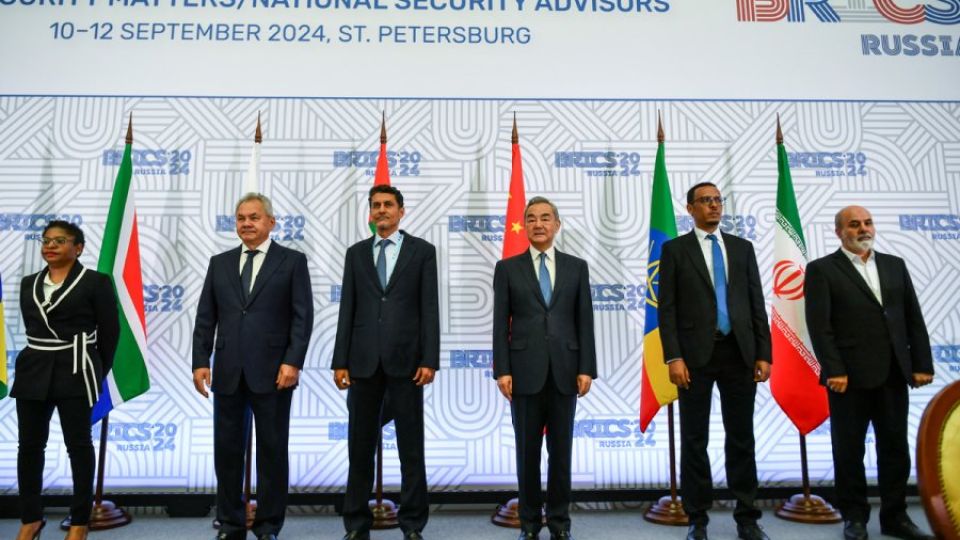September 12, 2024
ST. PETERSBURG – At a high-level BRICS gathering on security affairs, Beijing has issued a four-point proposal, urging fellow members to practice peaceful coexistence, build on multilateralism, push for political settlement of crises and defend justice.
Wang Yi, a member of the Political Bureau of the Communist Party of China Central Committee and director of the Office of the Foreign Affairs Commission of the CPC Central Committee, raised the proposal on behalf of China in St. Petersburg, Russia, on Wednesday.
He was attending the 14th Meeting of BRICS High-Ranking Officials responsible for security matters/National Security Advisors.
Wang was joined at the meeting by representatives of countries ranging from Russia, Brazil, India and South Africa to Egypt, the United Arab Emirates, Iran and Ethiopia.
Observers noted that the meeting on Wednesday was the first of its kind following the recent expansion of BRICS, showcasing the widespread pursuit by Global South countries of peace, unity and self-reliance in policymaking.
Countries should break away from exceptionalism and double standards and “resolutely reject any words or actions that jeopardize the authority of the UN or deny the binding force of the (UN) Security Council’s resolutions”, Wang said.
He mentioned the upcoming United Nations Summit of the Future, scheduled for Sept 22 and 23.
China has called on fellow member states to take the summit as an opportunity to work together to defend the international system with the UN at its core, and to “support the UN to play a greater role in international security affairs”, he said.
Regarding the political settlement of hot spot issues, he said countries should “respect each other’s legitimate concerns, seek common ground while shelving differences during dialogues, and move toward each other in negotiations”.
Regarding the Palestine-Israel conflict, Wang emphasized the need for a cease-fire as soon as possible and called for opening up humanitarian channels and returning soon to the right track of the two-state solution.
In response to the lingering spillover of the Ukraine crisis, China and Brazil have jointly issued a six-point consensus on a political settlement of the crisis.
Beijing “welcomes the support and participation of more of the BRICS partners” to increase rational, balanced and constructive voices in the international community, Wang said.
Analysts said that BRICS is now a key platform for promoting multipolarity and multilateralism in the world, given the fact that unilateralism and protectionism are rampant and geopolitical conflicts have intensified.
Wang Yiwei, a professor at Renmin University of China’s School of International Studies and director of the university’s Institute of International Affairs, said, “After its most recent expansion, the BRICS membership is now spanning across Asia, Africa and Latin America, which signals the rise of the Global South.”
Regarding counterterrorism and cybersecurity cooperation, Beijing announced at Wednesday’s meeting that it is inviting counterterrorism officials from BRICS countries to visit the Xinjiang Uygur autonomous region again.
China “supports negotiations on signing a memorandum of understanding on BRICS cybersecurity cooperation”, Wang Yi said.
Beijing expects member countries to unite more nations in counterterrorism and cybersecurity efforts, share experiences and practices, provide capacity building support, and further strengthen the common position and actions of the Global South, Wang said.
Before the gathering, he met with Secretary of the Russian Federation Security Council Sergei Shoigu in St. Petersburg on Tuesday.
The two countries exchanged support for each other’s rotating presidency of multilateral groupings. Russia now serves as chair of BRICS, while China holds the chairmanship of the Shanghai Cooperation Organization.
Both sides said they “will continue to advocate and practice genuine multilateralism”, the Chinese Foreign Ministry said in a statement on Wednesday.
The two nations also exchanged views on the Ukraine crisis.
Shoigu briefed Wang Yi on Moscow’s position and welcomed the six-point consensus jointly proposed by China and Brazil for political settlement of the crisis, saying that Russia is pleased to see that the consensus has been widely endorsed by the international community.
Wang said Beijing will “garner more international consensus and pool necessary conditions” for an early cease-fire and the political settlement of the crisis.


